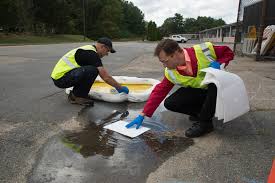
Difference between revisions of "Facility Inventory"
| (3 intermediate revisions by the same user not shown) | |||
| Line 1: | Line 1: | ||
==Municipal separate storm sewer system (MS4) facility inventory== | ==Municipal separate storm sewer system (MS4) facility inventory== | ||
| − | [[File:SpillCleanUp.jpg| | + | [[File:SpillCleanUp.jpg|thumb|right|alt=Staff cleaning after a spill at a municipal operations facility|Staff cleaning a spill at a municipal operations facility. Photo credit: Hanscom Air Force Base]] |
| − | The [https://stormwater.pca.state.mn.us/index.php?title=MS4_General_Permit MS4 General Permit] requires permittees to maintain an inventory of municipally owned facilities that | + | Municipal operations have the potential to impact stormwater. Preventing stormwater pollution from municipal operations not only protects stormwater, but also sets a good example of how stormwater is managed in your jurisdiction to those who live, work, and visit your community. |
| + | |||
| + | The [https://stormwater.pca.state.mn.us/index.php?title=MS4_General_Permit MS4 General Permit] requires permittees to maintain an inventory of municipally owned facilities that may pollute stormwater ([https://stormwater.pca.state.mn.us/index.php?title=MS4_PART_III.STORMWATER_POLLUTION_PREVENTION_PROGRAM_(SWPPP) MS4 General Permit Part III.D.6.a.]). Examples of such facilities include: | ||
*composting, | *composting, | ||
*equipment storage and maintenance facilities, | *equipment storage and maintenance facilities, | ||
| Line 22: | Line 24: | ||
==Resources== | ==Resources== | ||
| − | *[ | + | *[https://stormwater.pca.state.mn.us/index.php?title=Documentation_requirements_and_documents_to_retain_under_the_MS4_permit Documentation that MS4 staff should retain] - List of all the documentation requirements (what information to keep, how long to keep it, level of detail to keep, etc.) for compliance with the [https://stormwater.pca.state.mn.us/index.php?title=MS4_General_Permit MS4 permit] |
| − | *[[ | + | *[[media:Facility Inventory Template.xlsx|Facility inventory template]] - The MPCA's template for the Facility Inventory, which includes examples of types of facilities, facilities operations, pollutants associated with the operations, and BMPs. |
| + | *[[media:Facility Inventory Template.xlsx|Facility inventory template]] - City of Rochester's Facility Inventory template | ||
Revision as of 15:19, 25 January 2018
Municipal separate storm sewer system (MS4) facility inventory
Municipal operations have the potential to impact stormwater. Preventing stormwater pollution from municipal operations not only protects stormwater, but also sets a good example of how stormwater is managed in your jurisdiction to those who live, work, and visit your community.
The MS4 General Permit requires permittees to maintain an inventory of municipally owned facilities that may pollute stormwater (MS4 General Permit Part III.D.6.a.). Examples of such facilities include:
- composting,
- equipment storage and maintenance facilities,
- hazardous waste disposal facilities,
- hazardous or solid waste handling and transfer facilities;
- landfills,
- parks,
- pesticide storage areas,
- public parking lots,
- public golf courses;
- public swimming pools,
- public works yards,
- recycling facilities,
- salt storage areas,
- vehicle storage and maintenance (e.g., fueling and washing) yards, and
- materials storage yards.
In addition, the permittee must implement best management practices (BMPs) to reduce the impacts of these facilities to surface water (MS4 General Permit Part III.D.6.b.).
Resources
- Documentation that MS4 staff should retain - List of all the documentation requirements (what information to keep, how long to keep it, level of detail to keep, etc.) for compliance with the MS4 permit
- Facility inventory template - The MPCA's template for the Facility Inventory, which includes examples of types of facilities, facilities operations, pollutants associated with the operations, and BMPs.
- Facility inventory template - City of Rochester's Facility Inventory template
